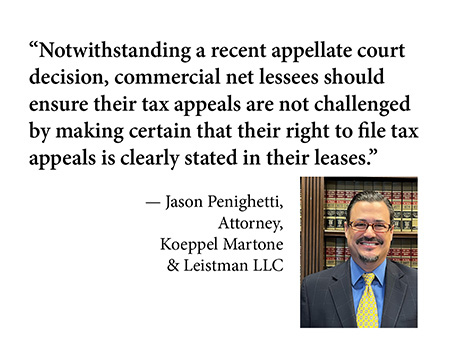By Jason Penighetti, attorney, Koeppel Martone & Leistman LLC
In a far-reaching decision, New York’s highest court has affirmed the rights of tenants under a commercial net lease to protest assessments and reduce their real property tax burden. The ruling reversed a State Supreme Court dismissal of a petition on the grounds that only a property’s owner can file an administrative grievance with the Board of Assessment Review.
In a net lease, the tenant is responsible for paying real estate taxes and other expenses stated in the lease. In the matter of DCH Auto vs. Town of Mamaroneck, the Court of Appeals in June 2022 published a unanimous decision stating that tenants contractually obligated to pay real estate taxes and authorized to protest assessments may file tax appeals even when they do not hold title to the underlying real estate.
Restoring a Precedent
DCH Auto operated a car dealership in a net leased property in Mamaroneck, New York. Its lease with the owner required DCH to pay the property’s real estate taxes in addition to rent.
Commercial tenants with this type of lease commonly file tax appeals to correct excessive tax bills and mitigate operating costs. These occupiers include retailers such as department and big-box stores, office building users, banks, drug stores and other businesses.
In the subject lease, DCH had the express right to challenge the subject tax assessment. Pursuant to the statute, it filed an administrative grievance with the town’s Board of Assessment Review. The Board denied the challenge, after which DCH petitioned for judicial review.
The town moved to dismiss, arguing that the petition was invalid because the incorrect party had filed the administrative grievance before the Board of Assessment Review. They alleged that the failure of the property owner to file the administrative appeal precluded judicial review of the board’s determination.
The lower court agreed and dismissed the petitions on the ground that only a fee owner may file the initial grievance complaints under the New York statutory scheme. The State Supreme Court’s Appellate Division, Second Judicial Department, affirmed the petition’s dismissal.
Thus, in one fell swoop, the Appellate Division obliterated over 100 years of precedent, which held that a net lessee that pays the real estate taxes is a proper party to file an administrative complaint challenging the assessment. Prior to the DCH lower court decision, it was never disputed that a net lessee was a proper complainant for filing both an administrative complaint and judicial petition. The lower court’s ruling effectively required absentee property owners — who do not pay the real estate taxes and have no skin in the game — to file an administrative appeal before a net lessee can file a judicial petition.
The Appellate Division decision placed in jeopardy thousands of real estate tax assessment appeals filed by commercial net lessees who have relied upon common, accepted practice and precedent, and interposed an owner standard where none is present in the plain terms of the relevant statutes.
Fortunately, the Court of Appeals reversed the lower court’s decision.
Who’s Who?
The case turned on statutory interpretation and analysis of legislative intent. At issue was Section 524(3) of the New York Real Property Tax Law (RPTL), which sets forth the process for the review of real property tax assessments. The provision specifies that an administrative complaint must be made by “the person whose property is assessed.” If a complaint is denied, then “any person claiming to be aggrieved” can file a judicial appeal pursuant to Article 7 of the RPTL.
The Town of Mamaroneck’s position was that the property owner must file the administrative complaint before any aggrieved person can challenge the result in court.
The Court of Appeals held that DCH and all commercial net lessees with the right to challenge assessments are included within the meaning of “the person whose property is assessed” under RPTL Section 524(3).
In its decision, the Court of Appeals considered the text of the statute and noted that “a person whose property is assessed” is not defined. A comprehensive review of the legislative history ensued, beginning with an analysis of the initial text of the statute as it existed prior to 1896.
The original statute permitted “any person” to file an administrative complaint. In 1896, lawmakers amended the wording to “a person whose property is assessed.” The Court examined the record, cited the New York State Commissioners of Statutory Revision that addressed the change in 1896, and noted that “there is no change of substance” with the revised wording.
In reversing the lower court’s action, the Court of Appeals based its decision upon the evolution of the statutory text and the consideration of the underlying legislative intent. The Court made clear that it was not the legislature’s intent to limit the meaning of “a person whose property is assessed” to the owners of real property, and that the reference includes net lessees contractually obligated to pay the real estate taxes.
Notwithstanding the DCH decision, commercial net lessees should ensure their tax appeals are not challenged by making certain that their right to file a tax appeal is clearly stated in their leases.
Jason Penighetti is an attorney at the Mineola, New York, law firm of Koeppel Martone & Leistman LLC, the New York State member of American Property Tax Counsel, the national affiliation of property tax attorneys. Contact him at JPenighetti@taxcert.com. This article originally appeared in the August/September 2022 issue of Northeast Real Estate Business magazine.
Editor’s Note: Koeppel Martone & Leistman filed an amicus brief on behalf of CVS Albany LLC, United Artists Theatre Circuit Inc. and AMF Bowling Centers Inc. in the DCH Court of Appeals proceeding.


